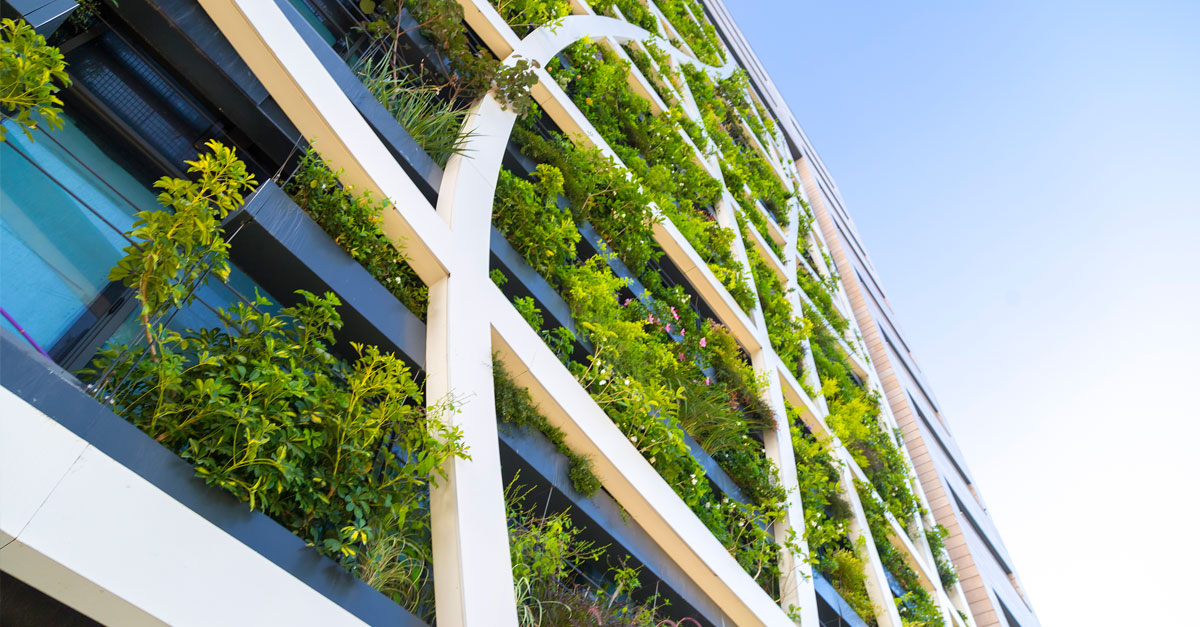A simple proposition has emerged from the personal experience of most knowledge workers during the last six or seven months. Working from home… works! Not on its own necessarily, and not for everyone, but as a broad idea…it works.
With that understanding – that the rows and rows of desks that we find in today’s modern offices are no longer necessary, at least not in the numbers that previously existed – we have an opportunity to shrink corporate footprints and turn the COVID-19 pandemic into a turning point in our battle against climate change.
The workplace strategists of the world have been telling business leaders for many years that there were kinder, more effective workplace ecosystems that didn’t require as much stress, cost, or time lost in accomplishing our work. They didn’t require individuals to come into the office all day, every day, and sit at a desk trying to concentrate while others around them were on conference calls, chatting or otherwise creating disruptions. Despite the evidence and the anecdotes of those who had been working remotely for years, there was still doubt as to the level of trust that could be reasonably placed upon the shoulders of individuals. But guess what? Human nature came through! Individuals rose to their responsibilities, confronted the challenges, corrected the things that weren’t working and were privileged to view a new world which, for many, worked really quite well.
Logically it seems not unreasonable to forecast that this position of trust will continue, that the advances in good will, productivity, improved work-life balance and the other positive surprises that have emerged from our mostly digital experiences will also continue. With this adjustment we should expect an associated refocusing on those activities which may properly reside in something we used to call the office. These might be expected to include:
- Complex, instant, fusion of knowledge to address high value, fast moving challenges
- Living creativity, serendipity and innovation associated with high value initiatives
- A place to access unique facilities and equipment that can’t be provided at home (for example labs)
- Activities that are confidential, sensitive or governed by regulatory requirements
- Someone who could work from home but whose high need for social interaction leads them to believe they need to be in the office
- The potential for unstructured learning and knowledge sharing
- A place for people that can’t (or prefer not to) work from home because they don’t have the facilities at home
- Availability of hands-on help desks
- Host and present to customers
- A place for social interaction
Not all these activities are requirements all day, every day, for the individuals to whom these activities apply, nor is the office as we used to know it the only place where many of these needs can be addressed. A whole ecosystem will continue to evolve using third places such as public spaces, co-working spaces and other places of hospitality, without making long-term commitments for access, capacity and control. These third spaces, in conjunction with homeworking, will increasingly serve as alternatives to fixed enterprise space and contribute towards the reduction of the permanent footprint of the organisation. They will also enrich the diversity of choices open to employees as potential working locations. The fact that these choices increasingly start appearing at, or closer to, home reinforces the potential for a very different carbon-footprint profile associated with “how we go to work”.
Recent experience with a number of large organisations sets a strong expectation that Corporate real estate footprints will reduce in size, and that additional layers of deep thought, ingenuity and out-of-the-box thinking, will be devoted to minimising the boat anchor-like qualities of our inflexible office portfolios. This highlights the possibility for a meaningful reduction in the carbon footprint. With individuals travelling less to work, a decrease in the carbon footprint of getting to work also becomes logistically possible.
How much of a difference can we make?
Recently three different organisations with whom we are working participated in surveys of employees and their managers, inviting them to compare their pre-pandemic workstyle and their preferred post-pandemic work pattern.
Figure 1 is an example of the results from one organisation but all three had very similar results. The black bars express the previous pre-pandemic reality, and the grey bars relay preferences for the future, relative to employees’ desire to work from home.
In summary, before the pandemic 74% of employees at this company either never worked from home, or did so less than once a week. Now, 84% are either working from home most days or 2-3 times a week. That is revolutionary.
Embracing these views, our team went on to calculate the space reductions of the three companies with the following results:
- Organisation one: 42% reduction
- Organisation two: 46% reduction
- Organisation three: 39% reduction
It should be understood that the space reductions were net calculations which embraced increases in space to accommodate for increased collaboration, socialising etc. The point is that the potential space reductions are not trivial. Major occupancy cost reductions are possible net of the need to invest in reconfiguration to address the new focus: less focus on concentrated, contemplative work and more on the collaborative and the social.
This reduction in space, should it be applied across the majority of the knowledge workforce, has the capacity to change the face of cities: to permanently reduce the demand for office space and to surface new opportunities which repurpose the excess space to, for example, address the housing needs of growing populations and to take pressure off the commuting stress and capacity demands prevalent in so many great cities.
This capacity to avoid new construction and reduce commuting is the big win for the environment. It reduces carbon emissions for commuting, operational carbon emissions for building operation and embedded carbon emissions from the avoidance of new construction.
The challenge, however, remains as to how prepared organisations are to host the dialogue required to satisfactorily work their way through the myriad points of view that need to be countenanced as they seek to build a response.
- Whether to acknowledge the post-Covid preferences of employees
- The attitudes and reactions of people managers
- The pressure upon organisations to ‘do the right thing’ for the environment, from employees, partners, customers, governments
- Those who seek to attract top talent to their organisations
- To real estate and IT organisations challenged to create superior workplace experiences while also being charged to reduce cost
- Bottom line improvement in business performance
- The global warming imperative
Each one of these interests is an area of expertise in and of itself, but experience suggests that few leaders are ready and skilled to enter such a multi-faceted reconciliation of such wildly diverse interests.
Starting here, right now, one is driven to declare the importance of quickly developing our future business leaders to be successful in the space between disciplines and not necessarily to require that they be a master of any one of them. It is vital for people in positions of responsibility not to shy away from the areas they don’t understand or are not familiar with, but to get involved and quickly learn to become conductors of new orchestras with different instruments, playing different tunes. We cannot follow our way to success on this issue. We need leaders like Bernard Looney of BP who is prepared to completely set aside the previous activities of the company and emerge with a new and inspiring view of the future and their role in it. Having an oil company reimagine energy is an inspiring example of the transformational thinking that is needed to help us continue life as we knew it, on this planet.
Using global warming as the call for action can we reimagine the arrival of a new driver that rises to the top of our agenda of priorities? Do we have the leaders who can help us make sense of the issues we need to confront? Let’s challenge the business schools and executive educators to quickly teach leaders to be design-thinkers, to embrace big ideas and to get out of their comfort areas in the search for bold new ideas.
Time to embrace the opportunity
Climate change is a topic that should exist in any responsible risk management scenario and yet it rarely forces itself on to the top priority list. The longer we delay, the more difficult it will become. Through COVID-19 we have been handed a great opportunity to make a difference. Let’s look at the workplace through a new prism and recognise that each business, no matter how small, has a chance to not only make a significant reduction in their carbon footprint but also to create an improved workplace experience for all.
Leadership for a better future:
This is one of a series of 13 practical articles on leadership written by the Future Work Forum (FWF) for the European Foundation for Management Development (EFMD), an accreditation body for business schools globally with a membership of 30,000 management professionals. Our partners have contributed to a special edition of their Global Focus magazine.

About the Future Work Forum:
The FWF exists to explore the working world of tomorrow. It is a think tank and network of highly skilled experts who share a passion to create a better, more humanised workplace, inspiring a new generation of leaders.


